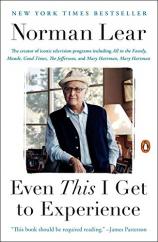Even This I Get to Experience
Review
Even This I Get to Experience
Describing one of the most entertaining artists of our time could be a challenge were it not being done by one of the most engaging writers of our time. Norman Lear on Norman Lear: a win-win.
In EVEN THIS I GET TO EXPERIENCE, Lear embarks on the story of his life by revealing that his father was a confidence trickster whom he always wished he could reform. He follows with childhood memories laden with Jewish one-liners: from his mother, who, when told her son was going to be one of the first inductees into the newly inaugurated NBC Hall of Fame, said, “Listen, if that’s what they want to do, who am I to say?”; from his grandmother, on her deathbed, waving goodbye with “I’ll be here --- if I’m here, I’ll be here.” Lear responded to Pearl Harbor by serving with distinction in Europe, and one of his wartime recollections was strictly showbiz: seeing a USO show in which the famous but despised (because of his 4-F status) Frank Sinatra was preceded on stage by the inimitable Phil Silvers, who, with slapstick and chutzpah, covered the singer in a “cloak of empathy.”
"Now in his early 90s, [Lear] thinks of himself as someone who likes 'to see that others have a great time.' Applying this principle to his autobiography, he entertains us once again, writing it not as a swan song but as a prelude."
In years to come, Lear would work with Sinatra and many other greats of film and the newly blossoming medium of TV, such as Jerry Lewis, Fred Astaire, Tony Curtis and Martha Raye. He grew gradually rich and mostly happy off a string of "dysfunctional family” classics, first and foremost “All in the Family.”Lear admits he modeled the blustering conservative Archie Bunker after his father and the querulous but loving Edith after his mother. Masterfully blending life and art, in the pilot episode Lear had daughter Gloria send Edith an anniversary card in Archie’s stead, containing an anniversary poem that Lear’s son had written years before, in his father’s stead, for his mother.
Lear’s other programs generated bigger-than-life characters, such as the acerbic Maude, the obstreperously ambitious George Jefferson, and the edgy, kinky-cute Mary Hartman. When thinking of these legendary productions, one can only picture them as played by the original cast. This proved something Lear learned early on working with Jackie Gleason: frustrating as it can be, the writer/director has to let funny people be funny in their own way. Lear knew intuitively that what makes people laugh is what they have lived. He brought minorities into our view by introducing us to bigots. By the time Lear had written or co-written for, directed, produced, cajoled and (in the case of Carroll O’Connor, at least) almost come to blows with some of the most popular stars of his time, his own name was as much a household word as theirs.
Lear graciously credits his co-workers and writes adoringly of his offspring, while remaining willingly self-critical of his imploded relationships, occasional not-so-great creative projects and quixotic business ventures. Now in his early 90s, he thinks of himself as someone who likes “to see that others have a great time.” Applying this principle to his autobiography, he entertains us once again, writing it not as a swan song but as a prelude.
Reviewed by Barbara Bamberger Scott on October 24, 2014
Even This I Get to Experience
- Publication Date: October 27, 2015
- Genres: Entertainment, Memoir, Nonfiction
- Paperback: 464 pages
- Publisher: Penguin Books
- ISBN-10: 0143127969
- ISBN-13: 9780143127963





